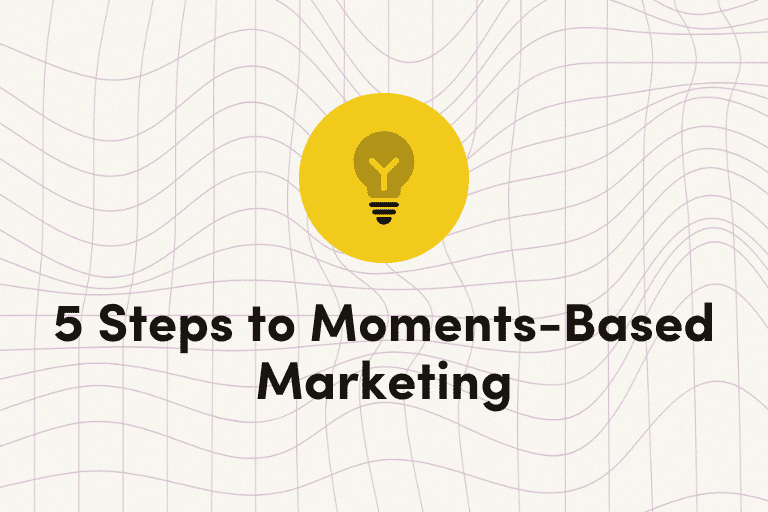Let’s get it out of the way: 2021 will not have typical marketing trends.
In previous years we’ve been able to make reasonably accurate predictions based on industry patterns. But in late 2020 those predictions are harder to make: The COVID-19 pandemic has upended nearly all facets of marketing strategy, sending marketers back to the drawing board.
After the roadblocks presented in 2020, what do marketers expect in 2021 when nobody knows what to expect?
To get a better sense of the year to come, Iterable set out to capture what’s on the mind of today’s marketers. We surveyed 500 business-to-consumer (B2C) marketers across the U.S. and U.K. to gauge their plans for 2021 and identify what really matters to marketers.
Here’s what we found.
1. Martech stacks will leverage more data and automation for customer acquisition
Marketers’ top three business priorities for 2021 are to increase new customer acquisition (65%), improve data management (44%) and optimize marketing automation workflows (41%).
These priorities align with the top three technologies respondents plan to add to their martech stacks next year as well: Marketing automation platforms, data warehouse/customer data platforms, and data analytics platforms.
The alignment of business priorities and martech stacks shows that marketing teams are trying to streamline customer engagement through better use of data. We expect this initiative to stick throughout 2021 and beyond. If leveraged properly, marketers only stand to benefit from reaching customers more efficiently through automation and tailoring messages to unique customer data insights.
2. Marketers will go all-in on AI and zero-party data
The vast majority of marketers (83%) said they’re likely to include artificial intelligence (AI) as part of their 2021 marketing strategy. And 84% are currently developing or planning to develop AI capabilities in-house. 78% of marketers also plan to use zero-party data—data given explicitly to a brand by customers—to better personalize messaging experiences in 2021. The focus on these technologies indicates that brands are doing everything possible to earn precious market share through personalization as consumers continue to spend less during the pandemic.
Marketers can leverage AI to better measure customer sentiment and curate more meaningful customer brand experiences. For example, most marketers currently use queries of never-ending customer signal sources or sift through billions of rows of engagement data to build a personalized brand experience. With AI, marketers can automatically calculate and classify customer sentiment to deliver effective messaging at scale.
While it’s clear why brands want to invest in AI technology, marketers should consider the cost factors of developing AI capabilities in-house. Given the high shortage of AI talent, hiring an in-house expert comes at a steep price. Furthermore, tasking an in-house expert to build a custom AI solution can be a significant financial burden. For a more cost-effective and viable way to use AI, marketers are likely better off leveraging existing AI martech technology.
Zero-party data is also ready for a big jump in utilization as brands identify new customer data sources to leverage in place of third-party cookies, which Google plans to eliminate by 2022. And even though consumers consider data privacy to be important, they still expect an individualized experience from brands.
Marketers can navigate this challenge with zero-party data by collecting data from consumers transparently and directly. Additionally, zero-party data gives marketers a chance to welcome consumers into a conversation with their brand as well as give them a share of voice and sense of partnership.
3. Almost 90% of B2C brands will have an app by the end of 2021
More than 60% of marketers we surveyed said their company has a mobile app and nearly 28% plan to build one in 2021. Only 11% of companies without an app don’t plan on building one next year.
Additionally, we found that marketers plan to increase their use of in-app channels (+7%), web push notifications (+5%) and mobile push notifications (+3%) from 2020 into 2021. This shift could be a result of the significant boost in mobile usage from consumers during the pandemic.
The emphasis on in-app and push notifications further solidifies marketers’ plans for AI and zero-party data in 2021, two components that lend themselves well to mobile consumer engagement. AI helps marketers better identify opportunities for customized push notifications and zero-party data can be acquired more easily through in-app offerings.
With marketers heavily investing in zero-party data and elevating in-app as a marketing channel, 2021 will solidify brand apps as a marketing standard as companies aim to create an ultra-personalized customer experience with more nuanced customer data.
4. COVID-19 concerns aren’t going away
Nearly one-third (29%) of marketers said “the growing demand for convenience and safety” is their primary business concern for 2021.
Top 3 business concerns for 2021 according to marketers
| 1. The growing demand for convenience and safety | 29% |
| 2. Brand empathy perception (i.e., how much my company is perceived to care by its customers) | 15% |
| 3. The disruption of loyalty (i.e., losing customers’ loyalty) | 14% |
The second and third biggest concerns for 2021—brand empathy perception by customers and the disruption of customer loyalty—are also related to the pandemic. This heightened concern indicates that customer preferences around COVID-19 aren’t going away from marketers’ plans anytime soon.
Given that many consumers have been advised to stay home during the pandemic, the fact that 60% of 2020 marketing budgets increased or stayed the same suggests a greater reliance from brands on martech solutions to spur creative customer offerings.
Marketers, in turn, had to innovate their customer experience to meet this stay-at-home need. As a result, many marketing teams likely shifted to martech solutions to better reach customers at home and provide safe, convenient offerings like curbside pickup, delivery and in-home entertainment.
What Does This All Mean for Marketers?
2020 propelled marketers to take back ownership of the customer experience and push the boundaries of their digital capabilities.
Evolving tech like zero-party data and AI can improve customer apps with a more personalized experience. And with customer acquisition top of mind for 2021, it’s imperative that marketers set themselves apart from competitors with increased personalization as consumers limit spending amid the pandemic.
If you’re looking to build a more personalized customer engagement strategy driven by automation and data, reach out to schedule a demo of Iterable’s cross-channel marketing platform.































